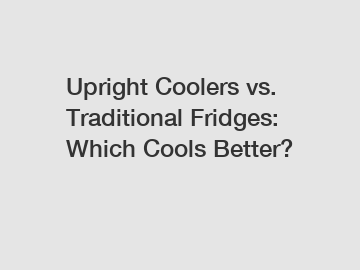Upright Coolers vs. Traditional Fridges: Which Cools Better?
Upright Coolers vs. Traditional Fridges: Which Cools Better?
When it comes to keeping our food and beverages cool, we rely on refrigeration technology to preserve freshness and extend the shelf life of perishable items. While traditional fridges have been serving us well for decades, upright coolers have gained popularity in recent years. But which one cools better? In this article, we will compare the performance of upright coolers and traditional fridges, exploring their key differences and benefits.
1. Energy Efficiency and Temperature Control.

Energy efficiency is a crucial factor to consider when choosing cooling appliances. Upright coolers are known for their ability to maintain optimal temperature levels efficiently. They are equipped with advanced cooling systems and insulation, ensuring consistent cooling while consuming less energy. On the other hand, traditional fridges may have varying energy-efficiency ratings depending on their make and model.
2. Flexibility and Space Optimization.
When it comes to flexibility and space optimization, upright coolers have an edge. They typically offer adjustable shelves and compartments, allowing users to allocate storage space according to their needs. Additionally, some models have reversible doors that can be opened from left or right, providing more installation options. In contrast, traditional fridges usually have fixed shelves, limiting customization possibilities.
3. Storage Capacity and Organization.
Additional resources:Choosing the Best Wine Fridge: A Buying Guide
Fridge and Wine cooler Guide | Page 3
Storage capacity is an essential consideration for many households and businesses. Upright coolers often provide larger storage capacities compared to traditional fridges. With their vertical orientation, they utilize the available space efficiently, offering more room for food and beverages. Moreover, upright coolers usually have clear glass doors, allowing users to easily locate items without opening the appliance and releasing cold air. Traditional fridges, on the other hand, may require more effort when searching for specific items.
4. Noise Level and Maintenance.
The noise level produced by cooling appliances can have an impact on our daily activities and overall comfort. Upright coolers tend to operate quietly due to their advanced compressor technology, making them suitable for environments that require minimal noise disturbance. Additionally, they often feature self-defrosting systems that reduce the need for manual maintenance. Traditional fridges require periodic manual defrosting, which may be inconvenient for some users.
In conclusion, both upright coolers and traditional fridges have their own unique features and advantages. Upright coolers excel in energy efficiency, flexibility, and storage capacity, while traditional fridges may require more maintenance but offer standard features that have been trusted for years. Ultimately, the decision between the two depends on individual preferences, available space, and specific cooling needs.
If you are still unsure about which option is best for you, consider reaching out to our knowledgeable team. We can provide personalized advice based on your requirements and help you make an informed decision. Contact us today to ensure your cooling needs are met!
[Closing paragraph with keywords: Contact us].
Contact us to discuss your requirements of Stainless Steel Commercial Refrigerators, Commercial Stainless Steel Refrigerators Manufacturer, Stainless Steel Commercial Refrigerators. Our experienced sales team can help you identify the options that best suit your needs.
214
0
0

Comments
All Comments (0)